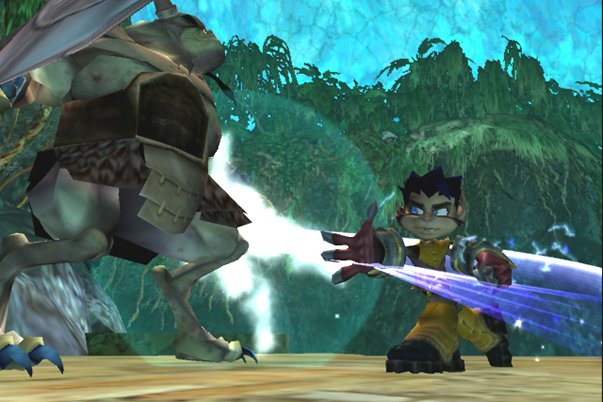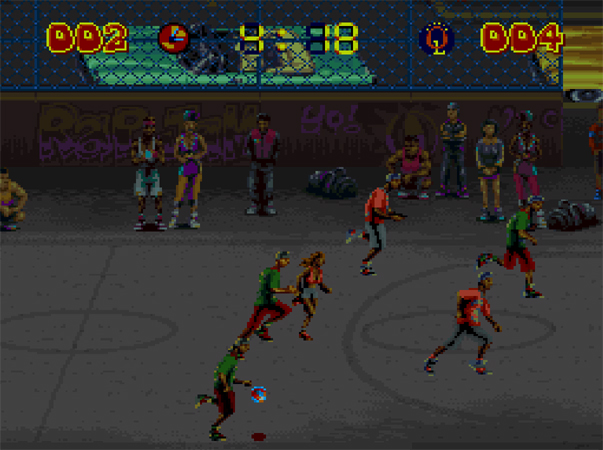The Top 7... Franchise failures
Take a look back at some of the industry's most fantastically disastrous non-starters
3. Vexx
2003 | PS2, Xbox, GameCube
The game: Before Shadow the Hedgehog started packing heat, Vexx was the poster child for a weird industry trend: taking cute platform mascots and trying to make them "dark" and "edgy" so as to appeal to 12-year-old badasses. Jak II was one of the few games to pull this off successfully, but Vexx looked like what you'd get if Eddie Munster and Wolverine somehow got the same monkey pregnant, and the effect was nothing short of ridiculous. His game, however, was standard 3D platform-hopping fare - hop around, beat up cute bad guys, collect the thingies (in this case gruesome beating hearts) and solve occasional puzzles. No surprises there - which is actually kind of surprising in itself, considering how much effort the marketing department at publisher Acclaim apparently put into making Vexx all hip.

Above: Look at this screenshot and tell us you haven't already played this a million times before
The ambition: This one should be painfully obvious. Right from the first press release's assertion that "There's a new 'bad boy' in town and every other character in the video game industry should be prepared to be 'VEXX-ed,'" Acclaim was hoping to out-market the likes of Crash Bandicoot and Sonic. Vexx's cherub face, deadly claws and "dark" attitude were all carefully calculated and focus-tested to be as sellable as possible. It's clear that Acclaim saw this as a potential signature franchise - and, probably, a way to yank itself out of the financial sand trap in which it was increasingly becoming mired.
What killed it? Aside from a general lack of interest, a laughable main character and a failure to distinguish itself from every other platformer on the market, Vexx was one of the properties sucked into oblivion when Acclaim went bankrupt in 2004. But don't worry, Vexx fans - all is not lost. In 2006, Canadian publisher Throwback announced it had acquired the rights to Vexx, along with a slew of other crummy Acclaim franchises; whether a Vexx sequel will actually materialize remains to be seen.
2. RapJam: Volume One
1995 | SNES
Sign up to the GamesRadar+ Newsletter
Weekly digests, tales from the communities you love, and more
The game: Long before Def Jam brought together large groups of rap artists to kick the gold fillings out of each other's heads, erstwhile developers Mandingo and 64WD assembled a crew of '90s MCs for a no-rules streetball tournament. With acts like Naughty By Nature, LL Cool J and all three members of Public Enemy signed up for the player roster, the game looked set to be a hit with fans of rap, basketball and that one MTV show where rappers played basketball.

Above: Believe it or not, you're looking at Flavor Flav, Terminator X and Chuck D facing off against LL Cool J, Warren G and Queen Latifah. Can you tell which is which?
The ambition: To eventually create RapJam: Volume Two, thereby giving Sticky Fingaz yet another videogame to inexplicably appear in.
What killed it? If you're going to make a game called RapJam, there are two things it needs to have above everything else: rap music and rappers. RapJam has neither. Its "music" is limited to one short, generic-sounding loop that plays during the title screen and menus (but not during the games themselves), and while you get to select your team from a broad assortment of hideous 16-bit rapper portraits, it doesn't make a damn bit of difference who you pick. They're all going to end up looking, dressing and playing exactly like Wesley Snipes in White Men Can't Jump. Except for plus-size hip-hop divas Queen Latifah and Yo-Yo (the only female rappers in the game), who look like tiny, reed-thin teenagers.
Then there are the supplemental characters, because when you buy a game about rappers playing basketball, what you really want is to see them playing against little kids and cartoonishly emaciated crack whores. It also didn't help that, as a basketball game, RapJam is broken - you'll mysteriously pass the ball to the opposing team, watch helplessly as your opponents leap dozens of feet into the air and grimace as you realize you can't tell any of the players apart.
But probably the game's biggest failing was that it grossly misjudged its target audience: SNES gamers were almost uniformly nerdy kids who couldn't give a damn about hip-hop if they tried. Sad but true.



